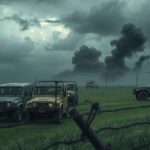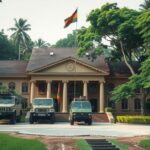Bangladesh Faces Rising Tensions Amid Speculation of Military Coup
In Bangladesh, speculation regarding a potential military coup has intensified amid growing tensions between the military and the interim government led by Muhammad Yunus. Army Chief General Waker-Uz-Zaman has dismissed rumors, urging patience and professionalism. However, significant military deployment in Dhaka and opposition from student organizations indicate a fragile political landscape, raising concerns about the future stability of the nation.
Speculation regarding a potential military coup or state of emergency in Bangladesh is escalating, particularly concerning the interim government led by Muhammad Yunus. Tensions are increasing between the military and the administration, alongside growing student-led movements advocating for change. The deployment of troops from the Bangladeshi Army’s 9th Division into Dhaka has intensified these rumors as they continue to mobilize in a phased approach within the capital.
Media reports from Northeast News reveal that the army appears to be consolidating its control in Dhaka, igniting fears of an impending coup. In response to these rumors, Army Chief General Waker-Uz-Zaman addressed senior army officials, urging patience and dismissing misinformation that could distract from military duties. He highlighted the importance of professionalism and resilience within the ranks, especially amid a volatile political landscape.
General Waker expressed concerns over the deteriorating law and order situation while emphasizing the dangers of misinformation. He reassured that the army’s utmost priority is to protect the country and its citizens, urging troops to remain vigilant against provocations. This comes after months of military support to civil administration following the ousting of former Prime Minister Sheikh Hasina and the establishment of the Yunus-led interim government.
In recent months, rising opposition from political parties and student organizations has led to increased tensions, indicating that some military factions are contemplating measures to suppress dissent. General Waker cautioned against impulsive actions that could benefit those looking to destabilize the nation.
The situation has been further complicated by allegations from student leaders. Asif Mahmud Shojib Bhuiyan accused General Waker of initially opposing Yunus’s appointment as chief advisor. Another activist, Hasnat Abdullah, has threatened a mass movement against the army following a reported secret meeting with General Waker, during which future political maneuvers involving Sheikh Hasina’s party were hinted.
As tensions rise within Bangladesh, the delicate balance between political uncertainty and military influence remains precarious. Although General Waker’s remarks aim to allay fears of a coup, the substantial military presence and growing opposition reflect the fragility of the current situation.
In conclusion, Bangladesh is navigating a significant period of political and military tension. Despite Army Chief General Waker-Uz-Zaman’s reassurances against coup speculation, the heavy military presence and mounting opposition highlight the precarious nature of the current environment. The country is at a critical juncture, with possibilities of martial law and the military’s influence on governance increasingly scrutinized by both the public and political actors.
Original Source: www.sentinelassam.com








Post Comment